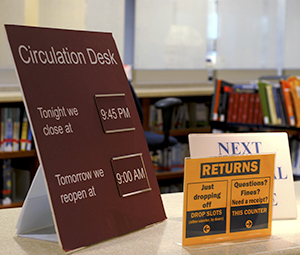University Libraries eliminates some late fees

Circulation desk at the Kent State University Library. Photo by Marielle Forrest.
The University Library has removed daily circulation fines for overdue items checked out from the KentLink book system.
The library wanted to move away from handling cash, said Jim Bracken, dean of University Libraries. Bracken said it is a liability for every person involved, and there is no need to waste time and energy on petty cash.
“We were levying fines of 10 cents a day. It is a nuisance,” Bracken said. “And on top of that, why are we charging fines at all when we have a million and a half books and no one is using them? Let’s just let them go out.”
University Libraries was invoicing around $100,000 in fines annually and waiving half of them without proper documentation or receipts.
“I think if you were the kind of person that was pushy, could exert pressure or had a good sob story, you wouldn’t have to pay your fines,” said Cindy Kristof, head of circulation for University Libraries. “We created a policy that would make it fairer for people.”
Bracken said the Faculty Senate’s Library Committee first saw the proposal for removal of fees in November 2008 and reviewed the plan in April 2010. After completing renovations of the main library, the University Library executed its plan with the removal of fees effective August 27 — the beginning of this fall semester.
“We always try to make a clean break with the past and the future,” Bracken said. “We wanted to do this when it was least disruptive to students.”
The University Library still has policies to ensure students cannot keep books forever. Kristof said after five overdue notices, communicated through email to students’ FlashLine accounts, students have to pay a fine based on the average price of a book — $125. Other circulation fines still exist.
Kristof said books associated with OhioLink, a statewide library consortium, still carry a fine of 50 cents per day. The Music Library still fines patrons because of a large number of multipart pieces that will get returned missing instrumental pieces. Items on reserve and any multimedia equipment in the University Libraries also carry fines if not returned.
Kristof does want to get books back when other students need them. University Libraries instituted a recall process so the library can alert a patron when another user needs his or her book.
Kristof feels this new policy will help the University Libraries “generate goodwill, keep patrons and create positive memories of the University Libraries.”
“The money has been used in the past to pay for public equipment,” Kristof said. “I don’t think it is a good thing to rely on the mistakes of other people to purchase things the library needs.”
Bracken and University Libraries has plans to make this new circulation fee policy even more liberal as this semester continues.
A full description of all circulation policies can be found at www.kent.edu/library/circulation.


